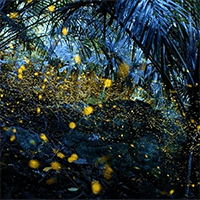- Age 10~Age 99
- 1~2 hours
- 10:00
Visit Komatsu's only remaining clover and experience stone processing! Takigahara-cho, Komatsu City is the production area of Takigahara stone, which has a beautiful blue-gray color. Komatsu City's numerous stone quarries (choba) with a history of over 100 years and arch bridges made entirely of stone are a major reason why Komatsu City has been designated as a Japanese heritage site for its stone culture. Ishizai Aratani Shoten is a stone shop that currently manages the only active stone quarry in Takigahara, where there were once many stone quarries. In this program, under the guidance of Mr. Shuichiro Funatsu, a geoguide who is familiar with the Takigahara area, and Mr. Yuki Araya, the owner of Ishizai Araya Shoten, we will tour the traditional arch bridges around the stone quarry and the inside of the quarry, while visiting Komatsu. You can see, learn about, and experience stone culture and history. Experience the beauty and functionality of Takigahara stone as a material that is used in a variety of places, from ancient tombs and grave sites to bridges, home entrances, and stylish cafes. *For foreign nationals: Information on the day will be provided in Japanese only.
以前から気になっていた滝ケ原の石切り場を見たいと思っていました。 実際に参加してみて良かったです。案内して下さった方の説明もわかりやすく面白かったです。場所によってはうす暗い所もありライトを持って行けば良かったなと思いました。
- Age 6~Age 100
- 1~2 hours
- 09:30 / 14:00
See, touch and experience. Learn all about the charm of joinery! Kamon Joinery Crafts is a joinery shop that produces furniture, fittings, and other "joinery" made by combining wood and wood without using joining tools such as nails. In this program, you will be able to experience Kumiko work under the guidance of President Kamon, who has honed his skills as a joiner for over 50 years. Please come and experience for yourself how the beautiful intricate patterns of Kumiko work are made and how difficult Kumiko work is.
- Age 3~Age 99
- 2~3 hours
- 10:00 / 13:00
Create your own outdoor space with iron ornaments made using partition production equipment! Comany makes partitions suitable for a variety of spaces, including offices, factories, educational facilities, welfare facilities, and public facilities. In this program, you can experience part of the process using dynamic partition production equipment and create original iron ornaments that can be used while camping. This is a must-see program for outdoor enthusiasts! *Ornaments will be semi-ordered, with the following options selected at the time of application.・Shape (3 types) ・Design (3 types) ・Main plate color (3 colors) ・Text (3 types of font) ・Favorite word (Upper case: 8 characters or less, Lower case: 16 characters or less *Each alphanumeric character)・Symbol only)
案内して下さる方や作業を教えて下さる方も本当に丁寧でわかりやすく教えていただいた。 申し込みの際は作業予定時間は長いのかなと思って参加させていただいたが楽しくあっという間に時間が過ぎました。 本当に楽しくよい経験をさせていただきました。 ありがとうございました。 また機会があれば是非参加したいと思います。
- Age 1~Age 99
- Within 1 hour
- 10:30 / 11:30 / 13:30 / 14:30
A professional pottery that creates the shape and base of Kutani ware. Miyayoshi Ceramics is one of the largest in this Kutani ware production region, creating a wide variety of shapes, from small chopstick rests to large items such as urns and plates over 50 cm in diameter. That's no wonder; the Miyayoshi Ceramics factory boasts one of the best types of molding in the region, and is able to create shapes for pottery using a variety of tools, machines, and people's hands. In this program, you will be able to see the world of Kutani ware forms that are lined up at Miyayoshi Seito, which is said to make everything except ornaments. You can also purchase original Miyayoshi Pottery products at the gallery attached to the factory. Please feel free to pick up and experience the evolving techniques of potteries that have been passed down in order to preserve tradition in the face of changing times.
- Age 3~Age 99
- 1~2 hours
- 10:00 / 14:00
Leave the stone thing to me! From processing to stone-baked potatoes! ? Onishi Stone has been processing various stone materials, mainly local stone materials. Because stone is heavy, the technology for processing stone in that region has been developed and developed specifically in the region. In this program, Mr. Onishi, who is a stone geek who can talk about stones all the time, will guide you around the factory. While explaining the graves and stone works that Onishi Stone has made so far, you can experience the local stone culture. *For foreign nationals: Information on the day will be in Japanese only.
小学生の子供を連れていきましたが、とても詳しく優しく教えて頂き、子供でも楽しく体験することが出来ました。ダイヤモンドが付いている歯に感動したみたいです。水晶焼き芋もとても美味しかったです。短い時間でしたが、石材加工というお仕事の大変さや凄さがわかりました。 本当にありがとうございました!
- Age 6~Age 99
- 2~3 hours
- 13:30
The only place in Komatsu where you can visit a farm and experience stone processing! Takigahara Town, Komatsu City is a production area of Takigahara stone with beautiful blue gray color. The numerous stone quarries (choba) with a history of more than 100 years and arch bridges made entirely of stone are the major reasons why Komatsu City has been certified as a Japanese heritage site for its stone culture. Ishizai Aratani Shoten is a stone material shop that manages the only active stone quarry in Takigahara, which used to have many stone quarries. The cave mining site is cool in summer and warm in winter, and maintains a consistent temperature year-round. In this program, an arch bridge and quarry made of Takigahara stone will be guided by Mr. Shuichiro Funatsu, a sculptor and geoguide who uses Takigahara stone for creative activities, and Mr. Yumi Aratani, the current owner of Stone Aratani Shoten. It is a unique experience where you can see and learn about Komatsu's stone culture and stone history while visiting the original. ☆ There is also a plan with a stone carving workshop ☆ After the tour, those who wish can touch and feel the stones at the stone carving workshop. *Reservations for the sculpture workshop have ended. We only accept visits. *For foreign nationals: Information on the day will be in Japanese only.
「本当に、この道であっているのかな?」そう、今回は集合場所に到着時する前からドキドキが始まっていました。看板はあるものの、奥まった所へと車を進める事になるので到着するまで不安が募りました(集合場所を見つけた時はほっとしました)。 体験はまず、案内をしてくださるガイドの船津さんと、当主の荒谷さんの紹介から始まり、安全のための注意事項の説明、それからヘルメットの装着をしました。 準備が整うと、重ねられた石の間を通り、工具等がある小屋の間を通って採石場の入り口へ。入り口を見たときは思わず吐いた息と共に「うわぁー」と声が漏れました。 大きく開いた入り口、壁は白っぽくて幾何学的な模様が刻まれていました。私には不思議でとても美しく魅力的に見えました。 採石場の中へ入り、独特な雰囲気を感じ、まるで異世界に来たような感覚がしました(どう感じたかは上手く言葉で表現できませんので割愛で)。 実際に石を切り出す所を見せていただき、石を切る時の音の変化を感じる事もできました。 また、石の状態を探りながら採石していく技術は長年受け継がれ、歴史と凄みを感じました。 お話していただいたことや実際に体験したことは全て興味深いもので、私は参加して良かったです。 今回、参加した時期が良く、外気と採石場の気温の差を感じる事が出来なかったので、また別の季節に参加したいと思いますいます。
- Age 6~Age 99
- 1~2 hours
- 13:30
It was also used in that famous cafe! What is the functionality of Takigahara stone? Takigahara Town, Komatsu City is a production area of Takigahara stone with beautiful blue gray color. The numerous stone quarries (choba) with a history of more than 100 years and arch bridges made entirely of stone are the major reasons why Komatsu City has been certified as a Japanese heritage site for its stone culture. Ishizai Aratani Shoten is a stone material shop that manages the only active stone quarry in Takigahara, which used to have many stone quarries. In this program, Mr. Shuichiro Funatsu, a geoguide who is familiar with the Takigahara area, and Mr. Yumi Aratani, the owner of Stone Aratani Shoten, have teamed up to guide you through the traditional arch bridge and inside the quarry. This is a tour where you can fully experience the beauty and functionality of Takigahara stone, which is used in various places, from burial mounds and graves to bridges, the dirt floors of ordinary homes, and stylish cafes. After the tour, we will hold a consultation meeting where you can consult us if you are considering using it as a building material. *If you would like to participate in the workshop after the tour, please apply below. Plan name: [Ishikawa / Komatsu City] Visit the only remaining farm in Komatsu and experience stone processing ★Workshop included★ *For foreign nationals: Information on the day will be in Japanese only.
普段入る事の出来ない石切場にお邪魔させて頂きました。どのように切り出していくか細かく教えて頂き、面白かったです。子供達も圧巻の空間に興味津々。実際に石が切り取られている場所をみると色々な発見があり、大人も子供も楽しめとてもいい経験になりました。
- Age 6~Age 99
- Within 1 hour
- 10:00
A giant tomato robot supports high-tech sorting! Komatsu tomatoes boast the largest production volume in the Hokuriku region. It is rare for farmers to go directly to the market, and they are shipped after being checked for size, color, shape, etc. in between by a sorting field. The fruit is sorted at a large-scale sorting facility that just opened in May 2021. In this program, you can observe how the fruits are sorted smoothly using state-of-the-art machines. Komatsu and Matsutsuki for souvenirs! It is also recommended to participate continuously with Honda Farm. It should be an interesting experience to take a peek at the flow from the production site to the distribution! ~ Flow of the day ~ Observation of the process from sorting to packing about 45 minutes * For foreign nationals: Information on the day will be in Japanese only.
- Age 15~Age 100
- 3~4 hours
- 13:30
Luxury stool making experience taught by furniture craftsmen and upholsterers LEON is a furniture studio that proposes, manufactures, delivers, installs, and even maintains furniture and living tools, based on the concept of "solid wood furniture that can be used for a long time." . AMANO is a chair upholstery workshop that reupholsters chairs and sofas, offering the idea of ``fixing and reusing.'' In this program, two such cooperative workshops have teamed up. After a tour and explanation of the workshop and gallery, you can create a stool that you can customize to your liking, including the wood species and fabric of the chair. Take your time to see, hear, touch, and experience the details of each product.
- Age 12~Age 100
- Within 1 hour
- 10:00 / 13:00 / 15:00
Time to face the once-in-a-lifetime wood that comes to the workshop after an eternity After graduating from university, he learned the technique of turning wood in the mountains of Kaga City, next door to Komatsu, and is currently working as a lacquer artist in Komatsu City. Ms. Fumiko Iku is a woodturner who manufactures products. In this program, you can experience making wooden bowls at Mr. Iku's workshop "Hoori", which is located in a rural village. Trees grow thick over decades, and even after being felled, they take a long time to dry before being brought into the workshop by chance. Mr. Iku's work as a woodturner is one in which he stoically faces the products of time. In this program, we invite you to learn about the roots of the tree, feel the warmth of the tree itself, and feel the wonder of handiwork, and try making your own wooden vessel. It's sure to be a treasure for a lifetime.
- Age 0~Age 100
- 1~2 hours
- 14:00
When you hear that we are a ``mold shop'' that seriously makes things with professional 3D printers in the 10 million class, how many of you are immediately drawn to it? Daimol is one of the few companies in the Hokuriku region that makes molds for making metal parts. Efficiently producing a large number of parts and creating prototypes for that purpose are two different things, even in the same metal processing industry. Molds are made by processing metal, but the essence of being a moldmaker lies in the design that takes place before processing begins. Since we make molds to make something that originally has no shape, we need to know what method to use to create the mold in order to achieve the desired shape, what kind of drawings are needed for that purpose, and the modeling process used to create the mold. It's work. In this program, participants will attend a graduate school to obtain an MBA, and will learn ideas for innovation and thinking methods for creating products through a workshop led by Daimol representative Kenta Osugi, who will help them realize what they want to create and design it. With support, you can model and finally create a shape using a 3D printer. We are looking forward to hearing from anyone who wants to take on the challenge of making something seriously using a professional 3D printer that the general public does not usually see! ! <Time schedule> 13:50 Reception 14:00 Check-in 14:10 Factory tour 14:40 Workshop 15:45 Presentation/discussion
- Age 8~Age 100
- 1~2 hours
- 09:30
Komatsu City is home to many ironworks, including suppliers of large manufacturers, who manufacture various products using iron. Komatsu Koki's Steel Materials Center supports these ironworks in terms of material procurement. Komatsu Koki, which supports monozukuri by cutting steel materials and drilling holes according to customer requests, is truly an unsung hero supporting the ironworks village of Komatsu City. This program provides an opportunity for participants to learn about "steel" and the work related to it through a tour of Komatsu Koki's steel materials center. *Showing the process by which elemental drawings published within Komatsu Koki become actual products.Touching iron and getting to know about iron.Trying people to see work scenes.Trying people to experience work.Original souvenirs. To hand over something To make and complete something To do in 1 to 2 hours Observe how souvenirs are changed) - Observe the production of souvenir products during the processing tour Observe the delivery truck - Observe the loading platform (ride on a stationary truck and experience the height) Original souvenir present (nameplate + drawing made by laser processing of iron material) )*Time schedule 09:15 Reception starts 09:30 Check-in/orientation 09:45 Tour starts 10:30 Truck test drive 11:00 Dismissal
- Age 6~Age 99
- Within 1 hour
- 10:00 / 13:30
~The world of vegetable dyes that are safe for children and sensitive skin~ We create ethical lifestyle products that are kind to people and nature using natural raw materials, such as textile products dyed with vegetable dyes and towels woven from Japanese paper fibers. green job. In this program, Green Job's atelier, which is usually closed to the public, will be opened to the public, and you will be able to experience bag dyeing using a mug using vegetable dyes that are safe for children. The material and dye are made from the same hemp paper as the face towels and body towels manufactured by Green Job, making it an easy bag dyeing experience.
- Age 16~Age 99
- 1~2 hours
- 10:00 / 14:00
The back side of the colorful color. Among the many "traditions" and "evolutions" of Nishikiyama kiln, there are many fans in the world view and charm of the work, and we pursue "Kinrande" works using gold leaf that we create independently. Kinrande kiln. The second generation owner, Minori Yoshita, is widely known as a living national treasure of Kutani ware. In this program, you can see the inquisitive spirit transmitted to the Nishikiyama kiln and experience a part of it in order to demonstrate the creativity that can be said to be a transcendental technique that looks very profane. Nishikiyama kiln with a history of over 100 years. In addition to traditional techniques, we are also working on new things in the face of the big question, "How will we deliver it in the next 100 years?" We will review traditional techniques, search for a way that is suitable for our current life, and train the staff of the kiln. Nishikiyama kiln manufacturing aims to integrate tradition and innovation. "Kinrande" Kinrande refers to the decorative technique of fixing gold on colored ceramics and its works. Beginning with the Song dynasty in China, it flourished from the Ming dynasty to the Qing dynasty. In Japan, the Kinrande appeared from the Genroku era of Edo, using the Ming dynasty's Jingde Town kiln as an example, and it resembled the "Kinrande" woven fabric woven with gold thread and cut gold leaf, so it came to be called by this name in Japan. rice field. There are techniques such as "drawing gold" to draw a line with gold paint, "swinging gold" to scatter gold powder, and "pasting gold" to paste gold leaf. * For foreign nationals: Information on the day will be in Japanese only.
- Age 13~Age 99
- 1~2 hours
- 10:00 / 14:00
The back side of the colorful color. Among the many "traditions" and "evolutions" of Nishikiyama kiln, there are many fans in the world view and charm of the work, and we pursue "Kinrande" works using gold leaf that we create independently. Kinrande kiln. The second generation owner, Minori Yoshita, is widely known as a living national treasure of Kutani ware. In this program, you can see the inquisitive spirit transmitted to the Nishikiyama kiln and experience a part of it in order to demonstrate the creativity that can be said to be a transcendental technique that looks very profane. Nishikiyama kiln with a history of over 100 years. In addition to traditional techniques, we are also working on new things in the face of the big question, "How will we deliver it in the next 100 years?" We will review traditional techniques, search for a way that is suitable for our current life, and train the staff of the kiln. Nishikiyama kiln manufacturing aims to integrate tradition and innovation. "Kinrande" Kinrande refers to the decorative technique of fixing gold on colored ceramics and its works. Beginning with the Song dynasty in China, it flourished from the Ming dynasty to the Qing dynasty. In Japan, the Kinrande appeared from the Genroku era of Edo, using the Ming dynasty's Jingde Town kiln as an example, and it resembled the "Kinrande" woven fabric woven with gold thread and cut gold leaf, so it came to be called by this name in Japan. rice field. There are techniques such as "drawing gold" to draw a line with gold paint, "swinging gold" to scatter gold powder, and "pasting gold" to paste gold leaf. * For foreign nationals: Information on the day will be in Japanese only.
- Age 1~Age 99
- Within 1 hour
- 10:30 / 11:30 / 13:30 / 14:30 / 15:30
Recommended for those who are interested in the production process, molding method, and on-site production of Kutani ware! ! We use a variety of Kutani ware molding methods that can only be found at kilns for mass production. We will demonstrate and explain in front of you while keeping a safe distance, so you can participate with confidence. Suitable for small groups or groups. *For groups (10 or more people), please contact us directly. ~ Flow of the day ~ 9:50 Meeting and reception Explanation of Miyayoshi Ceramics 10:00 Site tour (30 minutes) / ② 11:00 ~ ③ 13:30 ~ ④ 14:30 ~ ⑤ 15:30 ~ A wide variety of things such as pottery wheel and casting etc. Tour of the base manufacturing site *After the tour, stop by a souvenir shop and leave. For those who don't want to go home empty-handed after a tour, we will introduce you to the souvenir shop of our kiln, where we have a large selection of pottery that can only be purchased at the kiln.
- Age 10~Age 99
- 3~4 hours
Arrange flowers in Yasokichi's vase, eat from Yasokichi's vase, and let the story bloom. Until now, many craftsmen involved in Kutani have studied under the first and second generation Yasokichi Tokuda, and many master craftsmen of yesteryear have also trained at this kiln. Mr. Yasokichi Tokuda, the 4th generation owner of Kutani ware. Together with Yasokichi 4th, who continues to create pottery energetically, he says, "We are born from the earth and return to the earth. We use earth, our mother earth, as a material, and then return to the earth." , By arranging flowers in Yasokichi's works and actually using them as vessels, it is a program where you can enjoy Kutani ware not only by watching but also by fully using your five senses. *For foreign nationals: Information on the day will be in Japanese only.
- Age 12~Age 99
- 4~5 hours
- 09:50
<Points of this plan> ・ Full-scale cooking experience using local seasonal ingredients based on local cooking research ・ A certified guide will guide you to spots where you can feel local life such as shrines and markets. ・ Walk in a local back alley full of life that is not often used for sightseeing First, head to IN KANAZAWA HOUSE through a narrow alley full of life, with a glimpse of the everyday life of the locals. IN KANAZAWA HOUSE is a traditional Kanazawa Machiya-style building where you can feel the lifestyle of those days. The traditional townhouse has a large, renovated kitchen where you can experience cooking home-cooked meals. A cooking researcher born in Kanazawa will teach you special recipes using seasonal ingredients. The cooking process will be explained with demonstrations such as how to make soup stock, and home-cooked dishes will be handed down locally. When it's done, it's finally a fun meal. After a meal, take a photo at the townhouse, explore, relax while looking at the garden, and relax. 《Weekly menu》 Sushi course Oshizushi (Ishikawa's specialty), omelet, boiled plum shellfish, 1 local dish (4 dishes in total) Tempura course Tempura using seasonal seafood and vegetables, omelet, soup, local dish (4 items in total), rice ~ Flow of the day ~ 9:50 Kanazawa Station East Exit Tourist Information Center "Hyakuman-san" Meeting / Check-in 10:00 Walk from Kanazawa Station (about 1km) An English tourist guide will guide you. Cooking experience of home cooking at IN KANAZAWA HOUSE 14:00 Dissolution in front of Kanazawa Station
最近チェックしたプラン
Please wait a moment
![[GEMBA Monozukuri Expo 2023] An unexplored region that you should visit at least once! Get to know Komatsu's famous stone, Takigahara stone, from the site!の画像](https://img.activityjapan.com/10/51038/10000005103801_0tXNFYTM_3.jpg?version=1695956163)
![[GEMBA Monozukuri Expo 2023] Traditional Japanese techniques! Experience the world of joinery that does not use a single nailの画像](https://img.activityjapan.com/10/51110/10000005111001_gfrlJ0xj_3.jpg?version=1696215673)
![[GEMBA Monozukuri Expo 2023] DIY irons by experiencing the process from material processing to assembly!の画像](https://img.activityjapan.com/10/51047/10000005104701_NVjZIr6f_3.jpg?version=1696238102)
![[GEMBA Monozukuri Expo 2023] Leave the body of the plate to us! Visit Kutani ware potteryの画像](https://img.activityjapan.com/10/51018/10000005101801_Bwe3oL1b_3.jpg?version=1695890202)
![[Ishikawa/Komatsu City] See and experience the stone cutting work, which requires millimeter-level adjustments! With hot stone talk of the presidentの画像](https://img.activityjapan.com/10/44410/10000004441001_NVjZIr6f_3.jpg?version=1664515929)
![[Ishikawa/Komatsu City] Unexplored places you want to visit once! Experience the quarrying site of Komatsu's famous Takigahara stone ☆Sculpture workshop included☆の画像](https://img.activityjapan.com/10/44359/10000004435901_0tXNFYTM_3.jpg?version=1667260503)
![[Ishikawa/ Komatsu City] Explore materials! Get to know Komatsu's famous stone, Takigahara stone, from the site!の画像](https://img.activityjapan.com/10/44344/10000004434401_0tXNFYTM_3.jpg?version=1664505842)
![[Ishikawa / Komatsu City] Selecting through massive amounts of tomatoes in a blink! A chance to witness the latest fruit-selection technology.の画像](https://img.activityjapan.com/10/38608/10000003860801_sDo0MIO1_3.jpg?version=1636444325)
![[GEMBA Monozukuri Expo 2023] Choose the chair and fabric to your liking! Making a stool that will last a lifetimeの画像](https://img.activityjapan.com/10/51077/10000005107701_gfrlJ0xj_3.jpg?version=1696044139)
![[GEMBA Monozukuri Expo 2023] Create your own bowl with a glimpse of the work of a stoic woodturnerの画像](https://img.activityjapan.com/10/51073/10000005107301_gfrlJ0xj_3.jpg?version=1696041254)
![[GEMBA Monozukuri Expo 2023] 3D modeling at the “mold shop that gives form to your ideas”!の画像](https://img.activityjapan.com/10/51066/10000005106601_gfrlJ0xj_3.jpg?version=1695997573)
![[GEMBA Monozukuri Expo 2023] Visit Komatsu Koki, a steel material shop that supports "steel" monozukuri!の画像](https://img.activityjapan.com/10/51062/10000005106201_gfrlJ0xj_3.jpg?version=1696135822)
![[GEMBA Monozukuri Expo 2023] You can do it with a mug! Easy dyeing experience with natural plant dyesの画像](https://img.activityjapan.com/10/51023/10000005102301_D6tMutJM_3.png?version=1695900060)
![[GEMBA Monozukuri Expo 2023] Immerse yourself in the world of beautiful glazed gold colors created by living national treasures with a gallery tour and brocade experienceの画像](https://img.activityjapan.com/10/51016/10000005101601_X9MeawNo_3.jpg?version=1695888317)
![[Ishikawa/Komatsu City] KUTANism 2023 Workshop Tour: Immerse yourself in the beautiful world of glazed gold color created by a Living National Treasure, gallery tour and Kinrande experienceの画像](https://img.activityjapan.com/10/50978/10000005097801_X9MeawNo_3.jpg?version=1695703882)
![[Ishikawa/Komatsu City] KUTANism 2023 workshop tour: Let's enter! Kutani ware kiln tour course♪の画像](https://img.activityjapan.com/10/50972/10000005097201_Bwe3oL1b_3.jpg?version=1695702859)
![[Ishikawa / Komatsu City] Kutani ware experience tour to enjoy with 5 senses with Yasokichi Tokuda 4th generationの画像](https://img.activityjapan.com/10/44399/10000004439901_NVjZIr6f_3.jpg?version=1664778782)
![[Ishikawa / Kanazawa] Experience local cooking in Kanazawa and experience local life at the local back alley "Market"の画像](https://img.activityjapan.com/10/35783/10000003578301_mBDQW4j9_3.jpg?version=1612754910)







